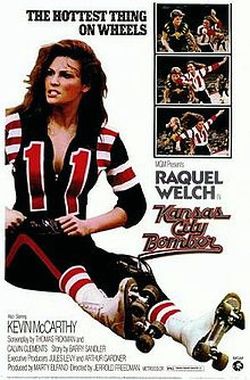 History is messy. The winds of cultural change seldom align neatly with our calendars; the things we think of as quintessentially 1950s, for example, like teenyboppers and nuclear testing and television, properly date to the 1940s. The same holds true for the 1970s, a decade which began in the midst of a sort of cultural bridge, a short period starting in the months after the Summer of Love and lasting to about 1973 and the early days of disco. Take the career of Neil Diamond, who I bring up not entirely because of my personal obsessions, but because his commercial image so accurately marks this rapid-fire change in popular culture. In 1966, he was a pompadoured kid singing country-rock pop tunes; by 1970, he was a moody, long-haired troubadour in flower power shirts; by 1974, he was sporting feathered disco hair and singing overwrought television duets while poured into spangly Lurex pantsuits. We can be as logical as we want to be, but when we see 1966 side by side with 1974, it’s difficult to comprehend the enormous transformations in American popular culture in those eight short years.
History is messy. The winds of cultural change seldom align neatly with our calendars; the things we think of as quintessentially 1950s, for example, like teenyboppers and nuclear testing and television, properly date to the 1940s. The same holds true for the 1970s, a decade which began in the midst of a sort of cultural bridge, a short period starting in the months after the Summer of Love and lasting to about 1973 and the early days of disco. Take the career of Neil Diamond, who I bring up not entirely because of my personal obsessions, but because his commercial image so accurately marks this rapid-fire change in popular culture. In 1966, he was a pompadoured kid singing country-rock pop tunes; by 1970, he was a moody, long-haired troubadour in flower power shirts; by 1974, he was sporting feathered disco hair and singing overwrought television duets while poured into spangly Lurex pantsuits. We can be as logical as we want to be, but when we see 1966 side by side with 1974, it’s difficult to comprehend the enormous transformations in American popular culture in those eight short years.
That’s why it’s so exciting to come across a cultural touchstone that helps fill in what feels like gaps in our collective memory, and that is exactly what Kansas City Bomber (1972) does. The kind of B-movie actioner that played on local television stations in the mid 1970s during slow afternoons when the baseball game got rained out, Kansas City Bomber is considered — when it’s even considered at all — a stereotypical 1970s film, probably something with faux commercialized feminism and skating to disco and plenty of camp.
Yet Kansas City Bomber is none of those things. Its reputation is about as inaccurate as a reputation can get, both in content and context. Kansas City Bomber is one of the better examples of low-budget cinema of the early 1970s, surprisingly influential, ahead of its time and a really terrific film. K.C. Carr (Raquel Welch) is a divorced mom of two who makes her living skating for the roller derby team the Kansas City Ramblers; the team is often mistakenly referred to as the “Bombers” in reviews, but “Bomber” is just her nickname, given to her later in the film.
Roller derby utilized much of the same showmanship as wrestling, with players adopting nicknames, a persona and manufactured clashes between teammates. K.C.’s personal bete noire is Big Bertha, played by real life roller derby star Patti “Moo Moo” Cavin. Bertha challenges K.C. to a skate-off — “the team is only big enough for one of us!” — and the loser has to leave the team. K.C. loses, and finds herself traded to the Portland Loggers, owned by savvy businessman Burt Henry (Kevin McCarthy).
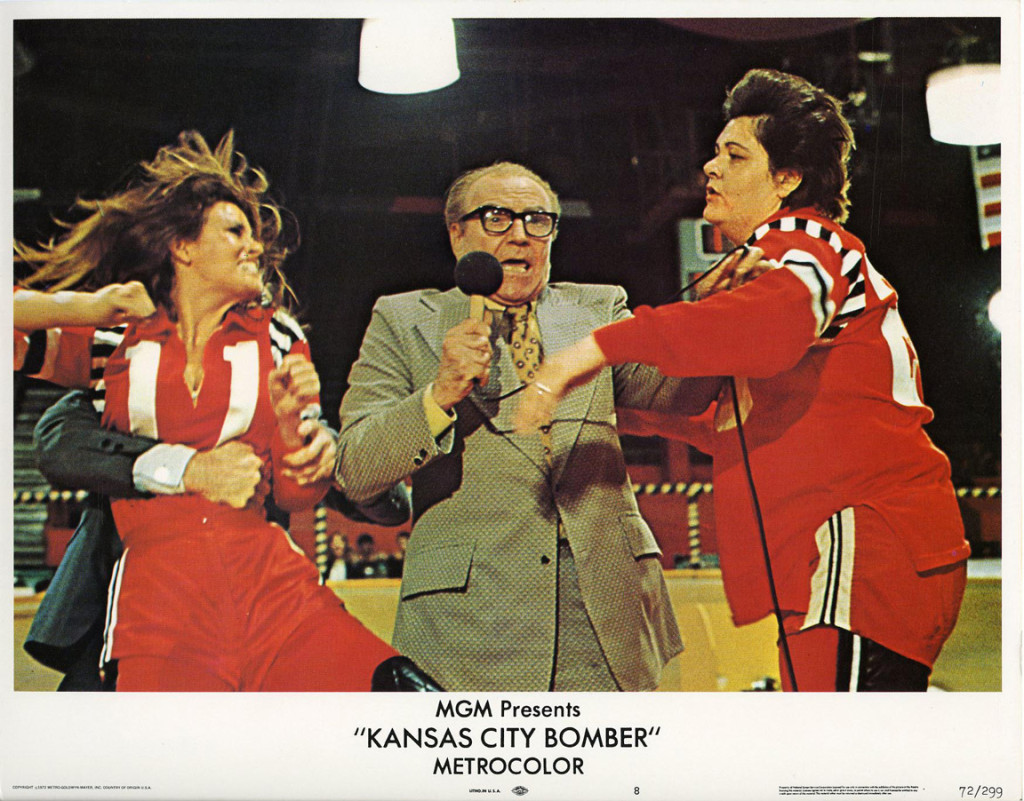 Legendary sports announcer Dick Lane also appears in Kansas City Bomber.
Legendary sports announcer Dick Lane also appears in Kansas City Bomber.
It’s questionable whether K.C. really knows that this was all a set-up. She and Bertha approach the challenge as a legitimate showdown, while behind the scenes, Burt and other managers take advantage of genuine antipathy between players, and haggle for who is going to be traded to what team. K.C. is relatively naive, the kind of athlete who joins a team because that’s what she’s good at, not so much to become a local or regional roller derby star. But it’s a difficult life for her, leaving her two young kids (Jodie Foster and Stephen Manley) with her mother as she travels all over the country, and her mother (Martene Bartlett) actively disapproving of her life.
Things seem to be looking up for K.C. when she falls for her new manager Burt, but he puts her on the second-level team, the Renegades, until she proves herself. Finally promoted to the Loggers, K.C. immediately clashes with the team’s top player, Jackie Burdette (a terrific Helena Kallianiotes). K.C. doesn’t even realize she’s in the middle of a fight, just keeps cheerfully chatting Jackie up, jumping into the men’s team play for the sake of honor and a good show, and trying to get along with the rest of the team, including the no-nonsense trainer Vivien (Jeanne Cooper). She makes friends with fellow skater Lovey (Mary Kay Pass) and Horrible Hank Hopkins (a wonderful Norman Alden) on the Renegades men’s team, but notices Hank is treated poorly by audiences — he’s what would be called “the heel” in pro wrestling — and also by his own teammates.
Still, when Burt promises her a new spot on a team in a town closer to where her children live, K.C. seems to believe everything is going her way. But Jackie knows the score, and soon even the clueless K.C. figures it out, too. Everyone is being used by businessmen looking to make a profit, and her friends start to fall victim to these money-minded machinations, while her teammates grow to resent her for getting favors because, to them, she’s just another lady sleeping with the boss.
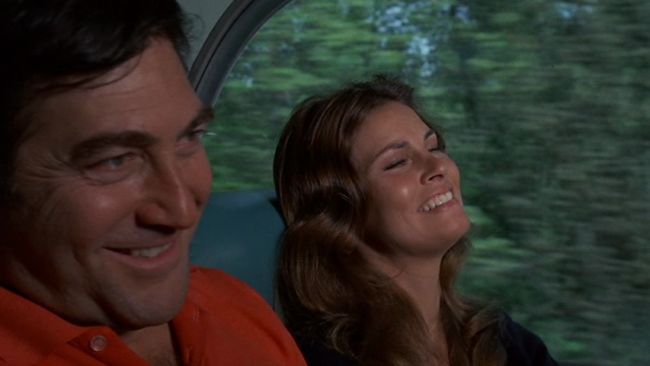 K.C. Carr and Horrible Hank share a laugh.
K.C. Carr and Horrible Hank share a laugh.
The realism provided by actual roller derby players is terrific. K.C.’s nemesis back in Kansas City, played by Patti “Moo Moo” Cavin, was a big woman, and her real-life derby persona involved humiliating nicknames based on her weight. In 1972 she was “Moo Moo,” but by 1973 she was with the Los Angeles Thunderbirds and going by “DC 10.” Horrible Hank, in comparison, is also a big guy, a farm boy who never really grew up, and Burt exploits this by encouraging the audience to shout pig calls at him, to which Hank will “soo-EEE!” back. But this hurts Hank, and K.C. can see it, even if no one else can.
If the humanity in her teammates is hard to find, it’s even more difficult to see in the outside world. Her mother refuses to understand her, wanting her to quit, move back to their small town and work as a cashier in a grocery store. But K.C. has dreams and wants her independence, and it’s refreshing to see a movie where someone has an unconventional dream that isn’t made fun of, nor is it glamorized. Much of the criticism of Kansas City Bomber is leveled at how silly and worthless roller derby is, how showing it on screen must necessarily be making fun of it. But the film treats it respectfully, with a lot of empathy and understanding that, lower-tier it may be, roller derby is still a job in the entertainment industry.
Preconceived notions of what is acceptable, glamorous or important, however, color the way the film is seen. Similarly, Kansas City Bomber uses actual roller derby crowds, a fascinating socioeconomic cross section of society, people of all races, ages, and even styles. When you’re looking into these crowds made up of real people and not extras reflecting the styles and fads that Hollywood entertainment product wanted to promote, you realize that the culture didn’t change as fast in the real world as the media made it seem. We see people in this crowd sporting everything from 1967 Head-era Monkees fashions to this amazing man in flashy striped Levis right out of the 1972 Montgomery Ward catalogue, but in frames that even John Lennon would have deemed out of date.
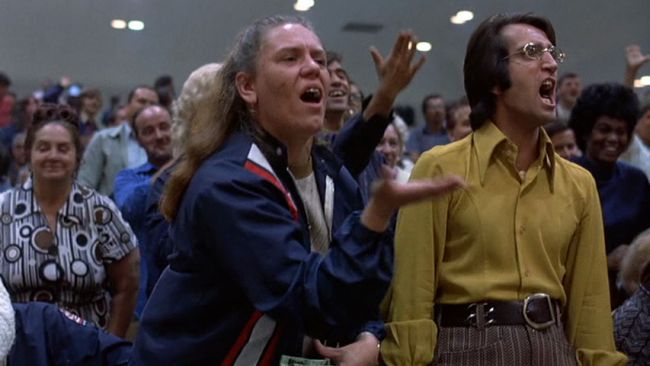 As you can tell from the look on my new boyfriend’s face, as well as those around him, the crowd gets worked up at a roller derby match.
As you can tell from the look on my new boyfriend’s face, as well as those around him, the crowd gets worked up at a roller derby match.
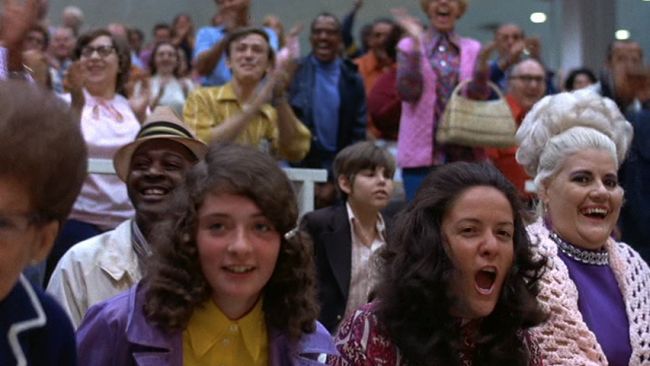 And a big shout-out to my new goal in life: The all-white modified beehive.
And a big shout-out to my new goal in life: The all-white modified beehive.
There is no one in this crowd that is not amazing, but again, many casual online reviews essentially state that merely showing real people in real clothes and real situations is making fun of them. It’s feels almost revolutionary for a non-documentary film to show reality so bluntly, though truth be told, Kansas City Bomber is not that many steps away from documentary. Roller derby was geared toward a working-class audience, people wanting to be entertained, pick sides and blow off steam, and Kansas City Bomber approaches that honestly and shows it as it happens. By 1972, roller derby had gained massive popularity, with some arenas selling over 50,000 tickets for a single game. Though the sport had been around since the 1920s, its time as a wildly popular sport was brief, from about 1969 until the gas shortage crisis of 1973; simply, teams could not travel by bus across the country anymore, and though fans were eager to buy tickets, no teams could afford the trip.
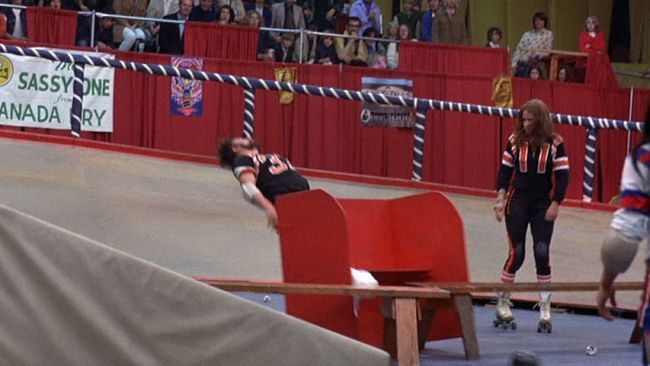 This is not a good screencap, but the look on K.C.’s face (#11, to the right) when this guy on the men’s team, who had been going completely nuts for five solid minutes, gets himself thrown head-first into a bench, is pure gold.
This is not a good screencap, but the look on K.C.’s face (#11, to the right) when this guy on the men’s team, who had been going completely nuts for five solid minutes, gets himself thrown head-first into a bench, is pure gold.
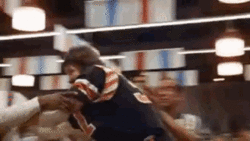
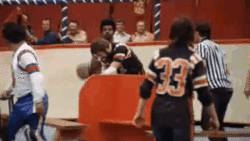
And then a guy from the other team puts a bucket over his head and punches him. ARE YOU NOT ENTERTAINED?
The cinematography of the bouts is quite good, with long shots capturing the action in documentary style, as well as some extreme close-ups that were quick-cut into the action where everything is just a blur, which adds to the chaotic feel. The editing, especially the audio integrating crowd sounds with the skaters, is terrific, and personally I much prefer this to the more stylized look of 1975’s Rollerball.
While the film approaches roller derby honestly, it falters at the casting of Raquel Welch as a regular skater who needs to be groomed into a glamorous persona. Welch’s appearance in the film is highly controlled and bears all the hallmarks of a Hollywood star: the hair, makeup, lighting, and a jersey tailored to show off cleavage in a way that makes her stand out from her team. There is the use of an obvious stunt double who keeps her hair — far less fabulous than Welch’s own — in her face to hide her identity. Even though Welch broke her wrist during rehearsals and likely needed a stunt double, the presence of one just adds to the obvious separation between her and the other actors, especially those from actual derby teams. Raquel was special, not a team member, and the film suffers for this distinction.
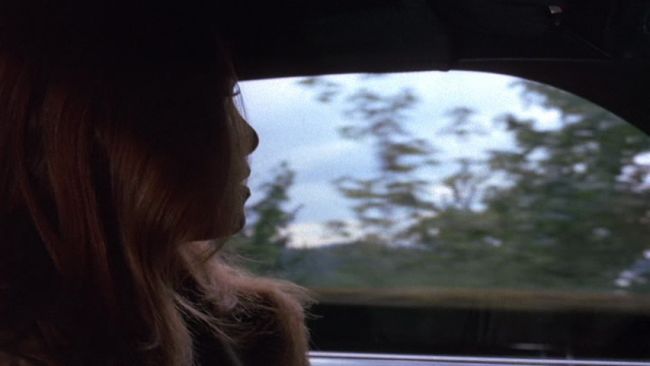
Kansas City Bomber was influenced by popular culture portrayals of feminism. Above, K.C. is seen driving to her new job in Oregon in a montage straight out of the opening of The Mary Tyler Moore Show. Later, a teammate is shown with a large “S” on her wall, reminiscent of Mary Richards’ famous “M.” This isn’t a surprise, given writer Calvin Clements, Sr.’s extensive work in television. Also working on the script were new writers Barry Sandler (The Duchess and the Dirtwater Fox) and Tom Rickman (Coal Miner’s Daughter).
The way the skating itself is approached is not exploitative, at least in an anti-woman sense. Kansas City Bomber is not one long catfight, as some have implied, because two women competing against each other in a sport is not automatically a catfight unless you bring your own preconceived notions into it. Again, however, the insistence on showing Welch in clingy knit clothing with nothing underneath is mostly unforgivable and undermines any point the film was trying to make, while also compromising the narrative: How can we believe she’s a naive, regular girl when she’s made up to be a cartoonish sex bomb?
You think this is bad, but when she turns to walk away, we realize the fabric is basically see-through under the lights, making her butt glow out from under the dress like a harvest moon. This tokenism coupled with Welch’s limited acting ability means Kansas City Bomber starts to become campy at times when it should be doubling down on the drama. She’s miscast, and her character is impossible to reconcile with the film’s overall message. But a fine supporting cast keeps it all railed in, as does a tight control of the script, which delves into noir at times. There are moments which will remind you of Night and the City, and dialogue that would not be out of place in Kiss Me Deadly, and the best part is that it’s no silly conceit: it works.
Kansas City Bomber passes the Bechdel Test with flying colors — and note that the Bechdel Test is only an analytical tool. No one is saying that a film is bad unless it passes; rather, that the idea of female characters talking about something besides a man is still so uncommon that it’s difficult to find it even in movies of today. Identifying films where women have lives beyond their relationship to men is important. In Bomber, almost every character could be easily played by someone of another gender, often with very little tweaking of characterization or dialogue.
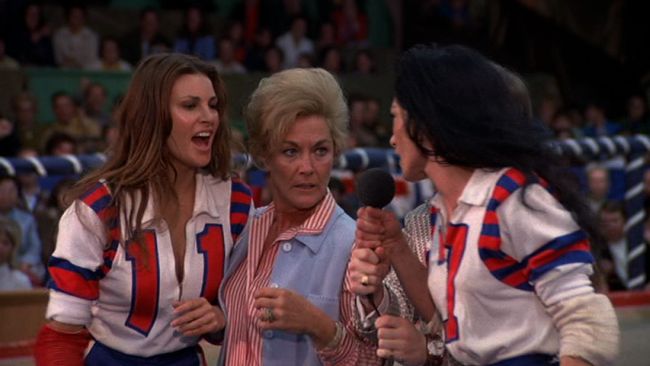
Thought the film doesn’t exploit women, the plot definitely hinges on the exploitation of workers through a broken system of capitalism. This capitalism combines with sexism to create a power dynamic where women are especially vulnerable, used for the financial gain of rich men wanting to get richer. Society reinforces this as K.C.’s relationship with Burt continues and she, but never Burt, is accused of impropriety. None of this is preached about or harped on but rather shown plainly, the film knowing everyone in the audience will intuitively get it.
Kansas City Bomber was undeniably influential on films like Rollerball and Death Race 2000 (both 1975), though largely shrugged off on its release. Helena Kallianiotes received a best actress nod at that year’s Golden Globes, and was the sole recipient of good notices. Most reviews at the time dismissed the film as a cheap morality tale, and notably, Roger Greenspun complained about K.C. being “beaten to a pulp” every five minutes, when she hardly gets beaten at all; “roughed up four or five times in the film, usually during a contact sport and without any visible signs of injury” is far more accurate. But take note: When one of my film critic brethren feels the need to exaggerate a film to make it look bad, that means the film deserves a second look, because there’s something in there making people uncomfortable.
That’s not to say there aren’t problems with Kansas City Bomber, as there are bound to be in any lower-budget film from that era, and for low-budge aficionados looking for the camp and the silly, there is enough here to keep you entertained. Greenspun pointed out a particularly hilarious bit with a taxi kept waiting, for example, the kind of thing I think all of us will enjoy. Those looking for something more substantial and interesting in this film will find it, too. And of course, there’s the fun of watching a movie that on first glance looks like a 1976 ripoff of well-known cult classics but turns out to actually be the 1972 movie that influenced them all.
Kansas City Bomber is available on MOD DVD from Warner Archive, in a great print with all the delicious, nutritious grain intact, and happily comes with subtitles and the theatrical trailer.
Animated gifs courtesy True Blood Mashups.

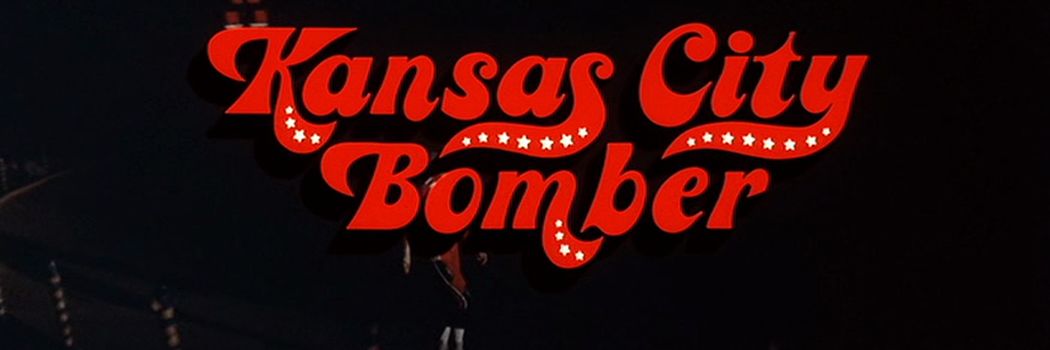
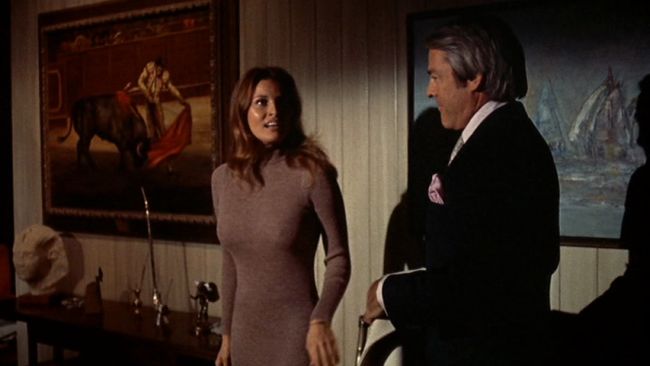
Great film, great review, but have to say you’re way off with your criticism of Welch in the leading role…..Watch it again, and watch her performance closely…..She is present, totally believable, vulnerable, loud when required, quiet and introspective and really in character when she relates to every other character in the film….I get the feeling you went in with some bias against her to begin with…..
The scene with Jackie at the railroad tracks…..The scene with her mother….The scene with Hank on the bus…..The scene with Lovey discussing Jackie……Ect….Ect….Watch her closely….She is entirely in character…….We must not have seen the same film!……..You are being unfair and unkind to not give her credit for not just a good but an excellent performance…..
Everything else is spot on IMHO….A film that truly was overlooked when it hit in 72′ and today should be seen on a massive scale as a cult classic I would say….
You keep telling me to watch closely, when I believe the problem here is that you need to READ more closely. My primary complaints are with the filmmakers; the sole comments about Welch herself are that she has “limited acting ability” and is “miscast” as a regular, everyday tough girl who needs to be glammed up.
I appreciate that we have a difference of opinion, but don’t you think it’s a little extreme to launch into over-the-top accusations of unfairness and bias?
“I appreciate that we have a difference of opinion, but don’t you think it’s a little extreme to launch into over-the-top accusations of unfairness and bias?”….
I can appreciate the difference of opinion also Stacia…..Like I stated before, awesome review of a classic piece of Americana…….When I said watch closely it was in response to your comment “limited acting ability”…..I was referring to the unfair rap RaqueI Welch (in my opinion anyway) has as a mediocre actress (that’s what I meant by bias or unfairness)……I see a skilled performer in a well thought out performance if I watch closely in how she reacts to the other performers …..You see something different……Sorry, I wasn’t trying to be rude or unkind…..It just seems that because a girl happens to be pretty or glamorous we categorize the dream she can pursue, whether it be an office job, a movie goddess, or as it happened in KC Carr’s case a derby star….I say go for whatever the dream is, and treat others’ the way you want to be treated…… In the case of KC Carr, the film demonstrated no intentional nastiness on the part of the character, in fact, a concerted effort to get along with all…..She was tough on the job (which was required, Welch is larger than Jackie who is pretty also and nobody seemed to have a problem with her)…..Off the track she was vulnerable with 2 kids a broken marriage and happened to be a good looking gal, good on her…….Truck on Stacia and God Bless…..
Jackie who is pretty also and nobody seemed to have a problem with her
I was really hoping you weren’t implying that I came into this review with a “bias” because of Welch’s appearance, but I guess you were. No, I don’t “have a problem” with Welch because she’s gorgeous.
Welch is more personality than actress. Helena Kallianiotes is more actress than personality, and she rightfully received quite a bit of critical praise at the time, which is why nobody had a “problem” with her character Jackie.
If looks were the sole basis for critical praise then all the heterosexual male critics in 1972 would have showered Welch with praise and ignored Kallianiotes. But that’s not how criticism works. Not even with lady critics like me.
I really appreciate this detailed and sensitive review of this film. Of course, men my age, who grew up enthralled by Raquel Welch, love her in this movie. At the same time, your criticisms are legitimate. I think she’s very good when she’s supposed to be sensitive to other people’s pain, but she isn’t always convincing and it might have been more interesting to see a grittier, less glamorous lead.But as you suggest, the story is really amazing for any era of film and I”m glad that such a film exists in any form. The violent edge in the fans and in the actors is still fascinating. And for all the actual physical violence, the real violence still seems to me to be emotional or even spiritual. It’s the tone of the 70’s I lived through and remember. You are dead right about how this film makes some people uncomfortable and it’s easy to see why. It’s good to see your passion for this work. Your review really sounds like the film I saw.
Thanks Troy, I appreciate it.
Welch is good in the heartfelt, low-key scenes, like when she’s talking to Hank on the bus, or in her friend’s apartment.
I was too young to remember much of the 1970s but your point that this resembles how the 1970s really were is a good one. KCB just *looks* like I remember that decade looking, although without the holdovers in 1960s fashion.
Hmmmmm.Raquel,it seems,passed on two opportunities to date skaters,but beds down with the boss….Sorry,gals (especially),but to this cover boy handsome black Canadian lad to whom Raquel remains the ideal buxom babe,this is the same old story played out millions of times,even on June 12,2015,i.e.,the office bombshell sleeping her way to the top.(Though frankly,Roller Derby was hardly General Motors,Wall Street [or we Canucks’ Bay Street in Toronto,Ont.] or any other conglomerate of which I am aware.)We boys should just take “Kansas City Bomber” as what it is:a great chance to look at Raquel’s bosomy figure!!!!!!!
I love that you love this movie and have taken the time to give it its due. I saw this film for the first time in the mid 70s as a young teen, and it hit me hard but I don’t know why. Seeing it as an adult you see more of the subtle depth of the movie and the truths of any workplace issues not just roller derby.
However, I do disagree with you on certain points.
Raquel:
“She’s miscast, and her character is impossible to reconcile with the film’s overall message.”
The screenplay was written with Ms. Welch in mind by a first time screen writer. He left it on her doorstep. This film does not get made without her star power of the time.
That being said, I think it’s the role and work of her career. While there is one cheesy dress she wears as noted in your review on a date with her boss, is this out of place? Maybe, maybe not depending how you look on it. Braless, underwearless were not out of norm for the time. (If looking for a scene that was cheesy, what about the shower scene? What was the point of that? Except to show Raquel in the shower, but you don’t really see anything, its just a tease.) Maybe she is not so naïve. Maybe subconsciously she is thinking of the boss is interested in her she is going to take what she can get from him so she wears it cause she knows what men like.
Further, I think, in this movie, Raquel’s is glammed down. Her makeup is minimal, her hair is messy, she has sweat on her face, her demeaner is very believable as a tough cookie. I hardly notice that the zipper of her uniform shirt is down slightly when she chewing gum during the national anthem, blurting out insults, skating, throwing punches, taking dives, hitting people with mops. If you are into the story you don’t even see it. This is her best movie ever. It makes it more interesting to see this sex symbol, glamour queen in this real gritty role. I think she is perfectly cast.
The opening and the ending are great.
I do agree they could have done better with the stunt double’s hair.
“Bomber” is just her nickname, given to her later in the film.
NO she is the Kansas City Bomber from the first moment of the film. She is playing for the Kansas City Ramblers, her nickname is the Kansas City Bomber from the start. After the grudge match with Big Bertha Bogliani (Yeah but her initials are BBB! – I love that line!) she moves to Portland but is still known as the “Bomber” but Kansas City is far behind. (Side note: There is a scene in a bar in Portland where KC is trying to connect with Jackie Burdette of Portland – Jackie is moody, grouchy and drinking. At one point Jackie asks KC. “Where do you come from? Where the hell did you come from?” … Rhetorical question?)
“she falls for her new manager Burt, but he puts her on the second-level team, the Renegades, until she proves herself. Finally promoted to the Loggers, K.C. immediately clashes with the team’s top player, Jackie Burdette (a terrific Helena Kallianiotes).”
I don’t know that KC “falls” for Burt or that KC is as naïve as you say she is. Clearly, she is torn in many directions while still trying to get along with the team members. You can see the worry on her face and doubt when the boss makes moves on her, but unnaively I think she, goes with him cause he is the owner has the power and says he has plans for her, which I think she thinks will allow her to bring her kids to live with her. Just before she starts making out with him in the hotel she says “I’m so lonely”. I think that is part of why she goes with him and also why she continues to try to make a connection with Jackie who is her true equal on the team.
As far as putting her on a second level team, that is not accurate. He clearly states to her in the locker room on the first day in Portland. That there is a contract dispute and the Renegades are claiming first right to her contract and until he can get this dispute resolved he tells her instead of skating with his team the Loggers she is to skate with the Renegades until the dispute is resolved. How it gets resolved is never addressed. But after a few times skating for the Renegades, he asks her to his office and throws the Logger shirt at her and says she now a Logger, She is happy because she states that playing for the Renegades is ruining her social life, and then takes her out to dinner that night.
K.C. doesn’t even realize she’s in the middle of a fight, just keeps cheerfully chatting Jackie up
I don’t know that this is the case. The first night at Lovey’s houseboat KC asks Lovely what Jackie’s problem is and Lovely tells her Jackie has been top dog, for 6 years, and knows that KC was brought to Portland to be top dog. “KC replies I’m beginning to get the picture.” KC does keep talking her up. But is that because she is clueless or is just trying to make a connection with a teammate, kindred spirit or maybe herself in a few years. Maybe Jackie was Burt’s women in the past. There could be may reasons for KC actions rather than cluelessness.
“Still, when Burt promises her a new spot on a team in a town closer to where her children live, K.C. seems to believe everything is going her way. But Jackie knows the score, and soon even the clueless K.C. figures it out, too.”
No. Burt is in the process of selling the Loggers and starting a franchise in Chicago. Her kids live in Fresno, CA. So this new franchise will take her farther from her children. At first Burt says bring them along, then just before the prearranged showdown with Jackie which will send KC to Chicago for loosing Burt tells KC the kids can’t come for a couple of weeks or a month due to promotional issues with the new team in Chicago. At this point KC, after Lovey binging traded, the release of Hank after the big fight and seeing Jackie, which could be her in a few years, and Burt’s duplicity, I think she comes to the point of no return Burt, leading to the grand final.
This is an excellent film, with surprising depth. It should be more well known.